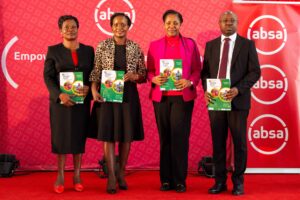
According to Trade, Investment, and Industry Cabinet Secretary Rebecca Miano, the primary goals of Buy Kenya Build Kenya are to encourage the use of locally produced goods and services, generate jobs, and lessen dependency on imports.
Miano said her ministry has therefore fast-tracked activities to ensure the initiative’s success, with these activities anchored on the already identified areas of the legal and regulatory framework to guide public procurement.
The Cabinet Secretary said her ministry has also created an enabling business environment, market access for locally produced goods and services, advocacy, and the creation of an institutional framework that ensures sustainability.
At least 40% of the Public Procurement Budget should be set aside for locally produced goods and services, according to the BK BK strategy, the Cabinet Secretary stated during her appearance before the Senate Trade Committee in the Parliament building.
“The disciplined forces have been acquiring various leather and textile products from local manufacturers to achieve this goal. For example, during the January–June 2023 period, the disciplined forces acquired leather and textile products valued at roughly Sh. 1.1 billion,” stated Miano.
According to the Cabinet Secretary, the Ministry has established a strong quality and regulatory framework through the Kenya Bureau of Standards (KEBS) that guarantees locally produced goods meet the established standards.
According to Miano, the Industrial Property Act and the Trade Marks Act are being implemented and enforced by the Kenya Industrial Property Institute (KIPI) to protect and promote indigenous innovations, thereby augmenting the production of goods manufactured in Kenya.
According to her, MSMIs can add value to locally made products by using common manufacturing facilities (CMF) provided by the Ministry through Kenya Industrial Research Development. With the help of CMFs, MSMIs can produce goods that are competitive in the local market.
“The Ministry is continuously creating awareness about the BKBK initiative through media campaigns and engagement, e.g., conferences, trade fairs,” Miano stated. “The Ministry is enhancing the skills of local industrial entrepreneurs by implementing a variety of value-added capacity building programs.” The ministry is working with various stakeholders to implement these programs.
The Cabinet Secretary told the committee that the leather sector is a priority value chain under the Bottom-Up Economic Transformation Agenda (BETA) with a potential of Sh 130 billion in revenue and 100,000 jobs.
The government has adopted the value-chain approach for the revitalization of the leather sector, which aims to unlock opportunities by creating jobs and generating income. Miano stated that some of the major challenges facing the sector include low hide and skin recovery, low-quality hides & skins, and inadequate skills.
According to the Cabinet Secretary, the current strategies being carried out with assistance from development partners and the private sector highlight the sector’s critical role in economic development, especially in the Arid and Semi-Arid Lands (ASALs).
Miano said the Ministry is supporting the revitalization of the sector by promoting value-added initiatives in the leather value chain, With the support of the International Labour Organization, the Ministry has developed the Leather Sector Revitalization Concept Note.
“The Concept Note outlines a comprehensive work plan and activities whose implementation is under discussion, this includes the establishment of Regional Common Manufacturing Facilities (CMFs) similar to Kariokor CMF to improve the productivity and competitiveness of MSMIs in the leather and leather products value chain. The Ministry is working with ILO to help map out potential leather clusters,” said Miano,
She said the Ministry, in collaboration with the Kenya Bureau of Standards, has revised some of Kenya’s Leather Testing Standards and adopted the Applicable International Standards These Standards aim at addressing current market, regulatory, and scientific and technological development needs.
The Cabinet Secretary said the Ministry, through the Numerical Machining Complex (NMC), has developed a prototype knife and de-hider to address the high cost of flying knives and de-hiders, which are currently being imported.
Miano said that in the financial year 2023/2024, the ministry, through the EPZA, was allocated Sh 350 million for the development of Leather Industrial Park-Kenanie and Sh 50 million for the Leather Value Chain Promotion Programme for the training of leather value chain stakeholders.
“The proposed establishment of 450 feedlot facilities in ASAL counties will further enhance the recovery and quality of hides and skins. A multi-sectoral technical feedlot committee coordinated by the Head of Public Service (HOPS) has tasked the State Department for Industry with the role of identifying value-added initiatives,” said Miano.
According to the Cabinet Secretary, the Ministry is working with Counties and Development Partners to construct County Aggregation and Industrial Parks (CAIPs) across the country. The Parks function as centers for the storage and value-adding of agricultural products.
Agro-processing units, value-adding units, and warehouses are some of these facilities. To improve the processing of food and cash crops such as tea, coffee, sugarcane, nuts, cereals, vegetables, fruits, dairy, meat, honey, and fish, the Ministry will work with TVETs, KIRDI, county governments, and other important stakeholders.
















